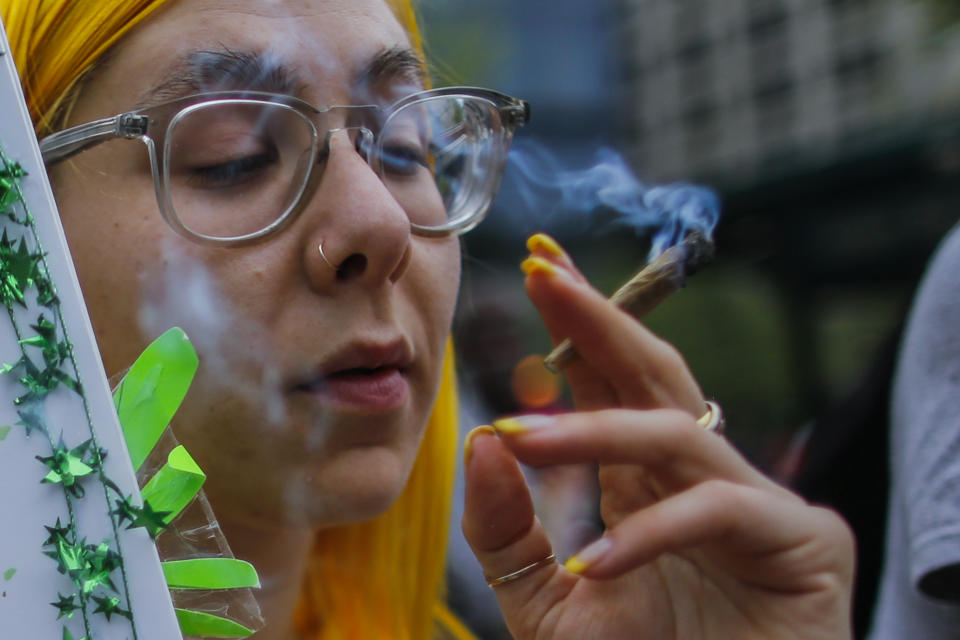No 'big pink bows': How companies are marketing marijuana to women

The cannabis industry has traditionally been dominated with male-centric marketing. Both recreational and medicinal use have focused on men and their needs. Search for “cannabis” and “advertising” and you’ll find images of Willie Nelson, Bob Marley and young men smoking up in arguably some of the most stereotypical depictions of cannabis use.
But some cannabis companies are hoping to change that image by targeting their products exclusively to women.
Fleurish Cannabis Inc. is a Canadian company hyper focused on women. They say women’s needs are different and more specific than men’s.
“Women indicate a higher interest in edibles, vaping and topicals than men do and a lower preference for consumption forms like smoking,” says Fleurish’s Chief Marketing Officer Mary Beth Williamson.
Unique reasons women report consuming cannabis includes relief from cramps associated with PMS, mood swings related to hormonal fluctuations and topical products to enhance sexual intimacy. In addition, women report higher incidences of stress, anxiety, insomnia and chronic pain than men do, Williamson says.
She says there are physiological differences in the way women and men’s bodies’ process cannabis as well, making a female focussed company even more relevant.
“Women are truly different from men which means we need different products and forms,” says Williamson. “Our physiology is different with the endocannabinoid system found throughout our body with a heavy concentration of cannabinoid receptors in our uteruses.”
Women are more likely to report they consume cannabis to relax or to relieve stress and anxiety, pain or insomnia. Williamson says, “Fleurish is developing our products by focusing exclusively on women which will enable us to serve women better.”
She says women also prefer different strains then men, which have more moderate THC levels to enable them to be more in control. As well she says women favour strains that contain CBD which does not cause euphoria or getting high. Williamson adds, women want fruity or floral terpenes which contribute to the taste and smell experience.
For its part Fleurish is developing strains consistent with these profiles, says Williams.
Forget the ‘big pink bow’
Olivia Mannix is the Founder & CEO Cannabrand, a full-service cannabis marketing and consulting agency based in Denver, Colorado, where recreational use of cannabis has been legal since January 2014. Started in 2014, Cannabrand has worked with many Cannabis companies helping them promote their products, including those that target women.
She cautions against companies putting a big pink bow on their marketing and making it woman friendly. She says women have specific wellness needs that men may not be as interested in. This includes facial lotions and creams and products to manage stress and anxiety. But, as Canada enters this space in the big way, she says a woman-focused cannabis businesses would be wise to make sure they are not cutting any one out.
“It’s important to have products that are for women that can also be appealing to men and the LGBT community.” Mannix says.
Katie Pringle, co-founder of Marigold PR, says targeting woman also makes good business sense.
“Women hold the majority of the purchasing power and are most often the ones making the health and wellness decisions for the household. Cannabis isn’t any different,” Pringle says.
Along with Marigold PR, Pringle also founded Canndora a community, shop and subscription box program targeting woman. Its website states woman have felt left out of the cannabis industry. They describe themselves a lifestyle brand, community and online shop for women who enjoy cannabis.
The industry is still young and the potential of cannabis use in Canada is largely unrealized. By getting in now, as a company that recognizes women’s cannabis needs, there is the potential to blaze a trail and become a leader in the industry.
“When it comes to marketing, it’s always advisable to be as targeted as possible, and really understand your consumer,” Pringle says. “It goes well beyond gender. Women are multifaceted, and have different purchasing behaviours, physiological makeup and wellness needs. Brands that understand their core consumer, and deliver on their brand promise, will win.”
Starting October 17 in Canada cannabis will be legal for recreational use in Canada.
According to Government of Canada website that means adults who are 18 years of age or older will be able to:
Legally possess up to 30 grams of legal cannabis, dried or equivalent in non-dried form in public.
Share up to 30 grams of legal cannabis with other adults.
Buy dried or fresh cannabis and cannabis oil from a provincially-licensed retailer, in provinces and territories without a regulated retail framework.
Buy cannabis online from federally-licensed producers.
Grow from licensed seed or seedlings, up to 4 cannabis plants per residence for personal use.
Make cannabis products, such as food and drinks, at home as long as organic solvents are not used to create concentrated products.
Edible products and concentrates will be legal for sale in October 2019.
Williamson says the potential is huge. “One in five women indicate they have consumed cannabis in the past 12 months – that is approximately two million consumers in the current grey market,” Williamson says. “Based on this level of usage, we conservatively estimated the current market to be $2 billion which is a huge opportunity.
“An additional 19 per cent of women indicated they are likely to try cannabis when adult use is legal after October 17. To put that in perspective, in my last role as CMO for Jamieson Vitamins, we competed in a total Canadian vitamin and supplement market that was less than $1 billion.”
Fleurish Cannabis recently announced that it is now officially licensed as a producer of cannabis under Health Canada’s Access to Cannabis for Medical Purposes Regulations.
Williamson says this puts even more pressure on the company to get it right.
Download the Yahoo Finance app, available for Apple and Android.

 Yahoo Finance
Yahoo Finance 
